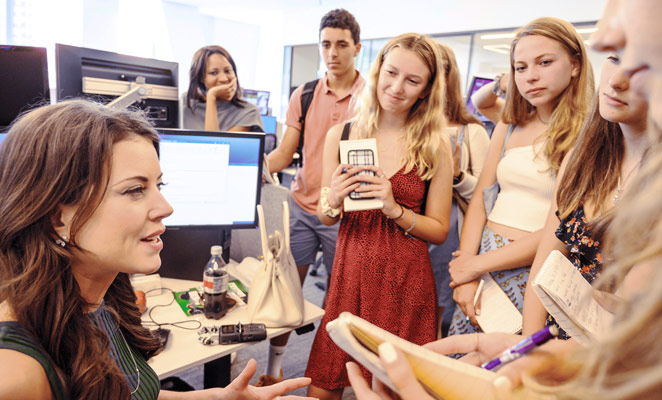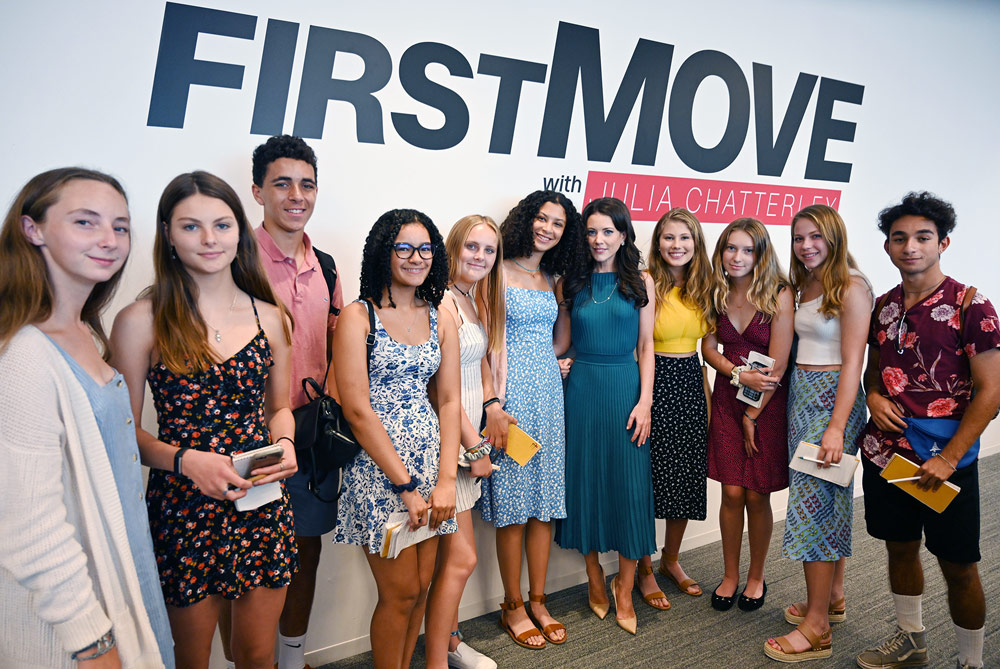INTERVIEW - August, 2019
On Location at CNN, An Interview with Julia Chatterly
The Noise Around Us
WRITERS/REPORTERS: Lilah Richman, Semira Robinson, Naomi Lenchner, Kylie Sebastian, Lyla Tipton, Zadie Winthrop, Sammie Dostart-Meers, Ashley Grady, Patrick Lenihan and Joshua Santos. (FROM: Marin Academy, Tamalpais High, Menlo School, Redwood High, Sidwell Friends, San Domenico, IMG Academy, and Urban schools)

“In the summer of 1922, the tempo of the city approached hysteria,” said x, the protagonist of F. Scott Fitzgerald’s novel The Great Gatsby, evoking a fresh urban vitality irresistible to ambitious young people like himself. It’s the same story today for most every dreamer coming to New York and other American cities in search of new opportunities and a new life.
Among them is Britisher Julia Chatterley, who was drawn to the U.S. because “that’s where all the noise was going to come from.” After graduating with honors from the London School of Economics, she followed in her parents’ footsteps and worked in finance for several years. But journalism held a deep fascination for her, and even a 95 percent pay cut couldn’t deter her from following her true passion.
“I went to work for free for the BBC,” says Chatterley. “Couldn’t make them hire me. Literally couldn’t, because I wasn’t a formalized journalist.”
Her experience exemplifies how journalism has evolved over the past several years. When Chatterley was searching for her first news job, there were strict standards hopefuls had to meet to enter the field. Nowadays, practically anyone can write a think piece and call themselves journalists. Moreover, online news outlets have proliferated with the explosion of social media.
But Chatterley is doing her bit to maintain television’s viability as a key news source. She has all the confidence and charisma the job requires, as we learned when we met her at CNN’s New York bureau, her emerald green fluted silk dress and stiletto heels setting off long brown tresses framing a ready-for-prime-time face gleaming with intelligence. On the fast-paced, live-from-the-opening-bell First Move with Julia Chatterley on CNN International, she talks business and commerce with the movers and shakers of the financial world from the floor of the New York Stock Exchange. Keeping up with the fluctuations of the stock market means absorbing new information on a constant basis, so Chatterley reads voraciously to keep current with the latest developments.
In today’s deeply divided world, gathering and reporting substantial facts about current events is about more than ensuring accuracy. A factual, well-rounded understanding of key issues also blunts accusations of biased reporting. When it comes to contentious political issues in particular, Chatterley’s responsibility is to decide when to be objective and when it’s appropriate to give her own opinion. “My job is to be the opposite of whatever the person [is who comes on the show]. So let’s take politics. You get someone who’s a Democrat, then I think it’s your responsibility to say ‘Hey, but this is why perhaps your ideas don’t work.’”
Chatterley is also drawn to the “noise” emitting from the technology industry. She sees user privacy as one of the most important issues of the day.
“Whenever I talk about Facebook, I get up on my soapbox because I think this is a really interesting one where we’ve had so many data leaks, we have a huge problem with privacy and the ability to keep our data private.” Young people, says Chatterley, haven’t taken effective measures to protect their personal information. When they do decide to delete Facebook, they usually just delete the app from their phones but keep their profiles active. Others defiantly switch to Instagram.
“But who owns Instagram? Facebook.”
Although journalists have a responsibility to report the facts, there are times when simple objectivity doesn’t underscore the consequences of—for instance—a business decision. This is especially important when the decision has negative consequences for the public. Chatterley believes in holding companies accountable, but she also feels the public has a role to play in protecting our personal information. We exchange it for the addictive pleasure of connecting with others on Facebook and Instagram, but the question is: is it worth it? “The price you’re paying for risking that data leak is the utility value of being able to use these social media platforms,” says Chatterley. “Is that exchange fair? You have to ask yourselves the question. I think it’s a high price because you’re risking your own data being leaked.”

Technology continues to be a major theme on First Move (during our visit Chatterley was preparing to celebrate the 50th anniversary of the moon landing), but the show attracts guests from a wide variety of industries, including a cannabis company CEO and a key decision-maker from the Federal Reserve. First Move promises to be a busy place in the hectic coming months: several presidential candidates, for instance, have proposed plans to reduce corporate influence in politics. And no one is more qualified to report from the crossroads of business and politics than Julia Chatterley. “Making good decisions about what you’re putting out there and what you’re taking in—there’s a lot of noise right now, particularly with politics in this country and women in politics in particular. It’s a great time to be listening to the noise around you.”